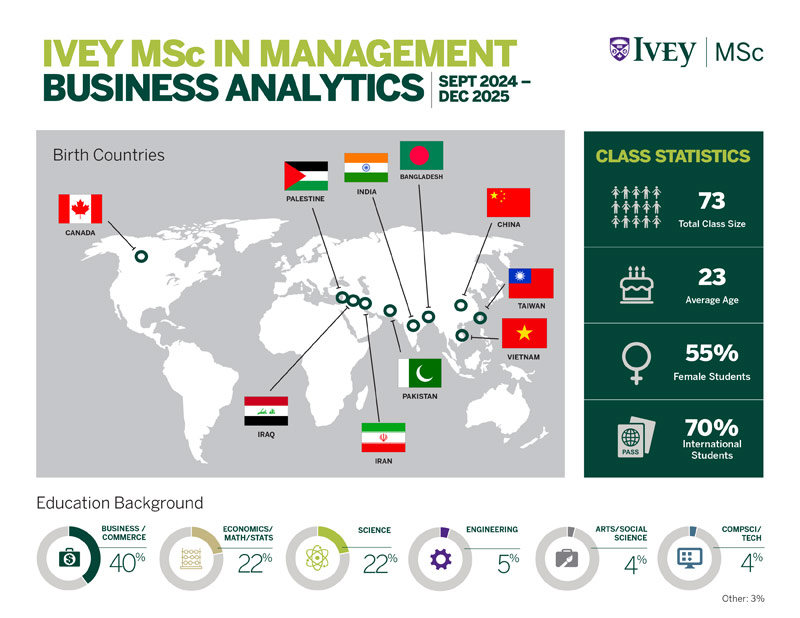Develop data driven business decision making skills.
In the Business Analytics field, you will develop the skills and capabilities needed to take today's growing wealth of real-world data and translate it into actionable insights for business decision-making.
These insights will generate new opportunities for growth and ready businesses for shifts in market dynamics. Build on your undergraduate degree experience and set yourself apart with Ivey's MSc in Management: Business Analytics.
Year at a Glance
Strong Foundation
The core subjects of the Ivey MSc in Management are intended to strengthen your business knowledge. We’ll spend the first six months building this foundation.
Term 1 - September to December
Term 2 - January to April
Term 3 - May to August
Ivey Analytics Internship
Exclusively offered to MSc in Management: Business Analytics students during the third term of the program, Ivey Analytics Internship (IAI) is a 10-16 week work integrated learning experience. Throughout this mandatory full-time internship experience, student hone their skills through either an analytics driven research project or through an analytics-driven industry internship experience.
Ivey has one of the largest and most qualified Career Management departments in North America. As a critical component of core curriculum, tactical Career Management courses are built directly into the first term of the program. As an Ivey MSc in Management student, you gain access to resources and support to help you explore diverse career options and develop a personalized career strategy. In addition, the Career Management team helps to foster and maintain relationships with many of Ivey’s corporate partners who recruit top talent for their summer intern hiring needs. The Career Management team strives to support each student in securing an internship experience that aligns with their career goals while meeting the established learning outcomes of the Ivey Analytics Internship.
The Ivey Analytics Internship is designed to give students industry knowledge, marketable skills, interpersonal and collaborative abilities and build professional networks to launch their careers and excel in the field of advanced analytics.
Term 4 - September to December
NHH Dual Degree
The MSc-NHH allows you to split your time studying at Ivey and at the Norwegian School of Economics (NHH) in Bergen, Norway. At the end of the MSc-NHH experience, you graduate with an MSc in Business Analytics from Ivey, and a second masters degree from NHH, MS in Economics and Business Administration, major in Business Analytics (BAN).
The NHH portion of your MSc in Management experience includes a mandatory research-based thesis. The MSc-NHH stream is an excellent option for students who do wish to gain valuable international experience while studying and living abroad. In this option, you will spend Terms 4 plus an additional term 5 studying at NHH.

